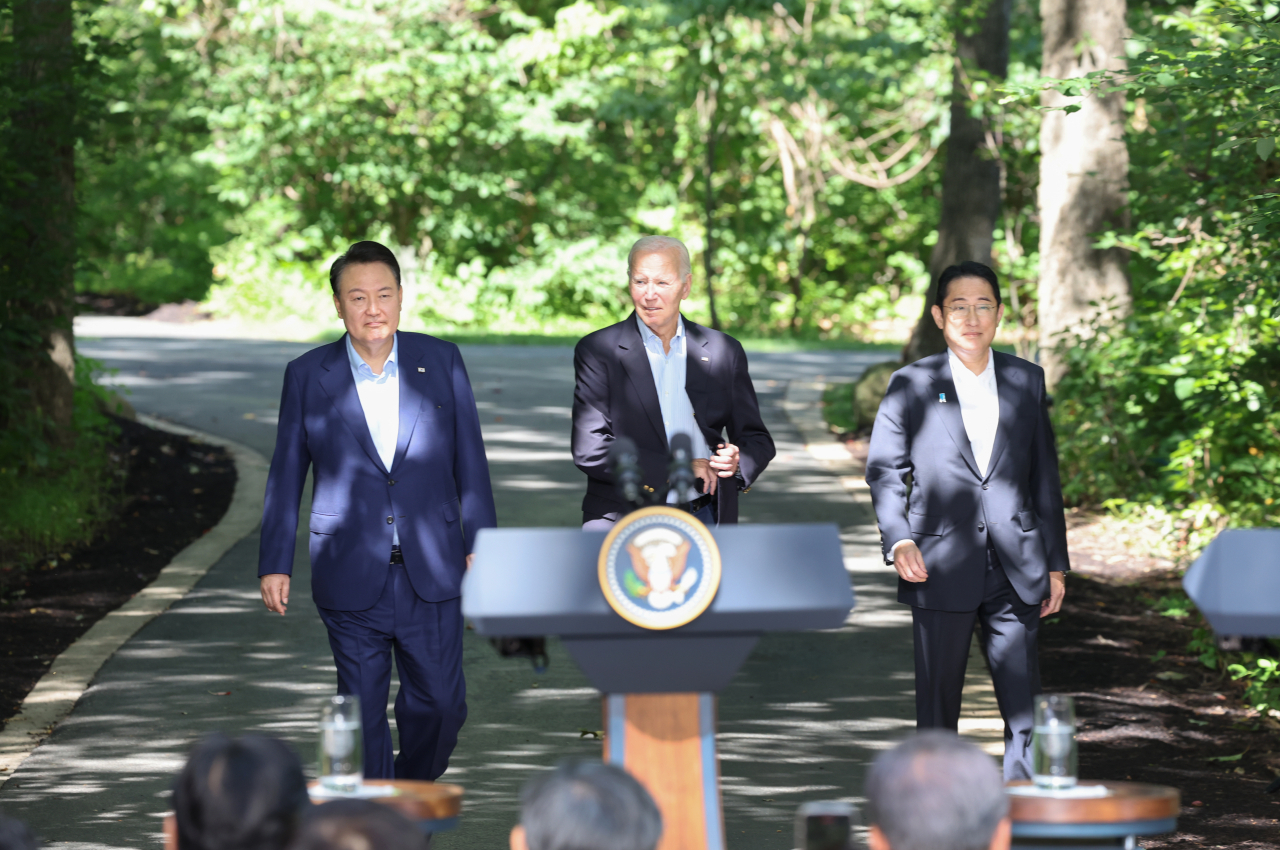Trilateral summit opens new chapter in security, economic partnership
By Choi Si-youngPublished : Aug. 20, 2023 - 15:45

South Korea, the US and Japan agreed to bolster security and economic cooperation at a Camp David summit Friday that sought a stronger coalition on China and North Korea, signing for the first time a pledge to jointly respond to common security threats.
The summit US President Joe Biden held with President Yoon Suk Yeol and Japanese Prime Minister Fumio Kishida at his presidential retreat condemned China’s “dangerous and aggressive behavior” in the South China Sea, reaffirming peace and stability across the Taiwan Strait.
In a statement, the three leaders said they “strongly oppose any unilateral attempts to change the status quo in the Indo-Pacific,” a reference to China’s claims that, if necessary, it could take over Taiwan, a self-ruled democratic island America supports.
The three leaders said they would share real-time data on North Korea’s missile launches by setting up a hot line for crisis communications. Joint military exercises will take place annually to prepare the US-led coalition for provocations from the North, a country that defies United Nations sanctions placed over its nuclear weapons programs.
Yoon stressed that the three nations had rolled out concrete steps to enhance joint response capabilities as North Korea’s nuclear and missile threats become more sophisticated than ever. They, Yoon added, will establish a working-level group to curb Pyongyang’s cyber activities meant to expand its nuclear arsenal. The steps to be taken make up a framework on dealing with North Korea, according to Yoon’s office.
The highlight of the summit was a “Commitment to Consult,” a three-way agreement to coordinate responses to “regional challenges, provocations and threats” affecting common interests. The commitment is not a pact binding each other to defend each other in the event of an attack, as it does not “give rise to rights or obligations under international or domestic law.”
But the commitment represents a bold step for both Seoul and Tokyo, which have only recently put behind their acrimony stemming from Japan’s 1910-45 occupation of the Korean Peninsula.
“It is the most of what they could come up with right now given what they just went through,” said Park Won-gon, a professor of North Korean studies at Ewha Womans University in Seoul, referring to the thaw in May when the two leaders revived “shuttle diplomacy” or their visits to each other’s countries after a 12-year hiatus.
Choi Eun-mi, a research fellow at the Asan Institute for Policy Studies in Seoul, said the two neighbors need “trust big enough to take their security ties to the next level,” a condition they have yet to see, Choi noted, citing public opinion.
Some Koreans consider resuming shuttle diplomacy coming at the expense of Seoul being overly soft on Tokyo for its colonial wrongs.
“The Korean and Japanese governments should do more to convince their people that this pledge is a good deal,” said Lim Eul-chul, a professor at Kyungnam University’s Institute for Far Eastern Studies in Seoul.
China’s potential economic blowback also concerns South Korea. China’s state-run Global Times newspaper accused the US-led coalition of forming a “mini-NATO” group that harms regional security, referring to the Western military alliance. Beijing retaliated against Seoul in 2017 over its decision to host a US-made anti-missile battery.
“We need to double down on closer Seoul-Tokyo ties to fight off North Korea. We will have to make room for China as well but that shouldn’t mean we don’t do what we are supposed to do in the face of escalating nuclear threats,” Shin Kak-soo, former South Korean ambassador to Japan, said.
South Korea could use the latest pact to communicate its North Korean concerns better to China, according to Kang Jun-young, a professor of Chinese studies at Hankuk University of Foreign Studies in Seoul.
“The security arrangement bringing Seoul, Washington and Tokyo sends a message to Beijing,” Kang said. “That is China too needs to adjust policy on South Korea,” Kang added, referring to Beijing’s public warning early this year that Seoul’s pro-US policies could bring it harm.
Meanwhile, the Camp David summit discussed launching early warnings for supply chain shortages, a system meant to de-risk from China, the top trade partner for both Seoul and Tokyo. The South has been reluctant to take part in Biden administration trade curbs aimed at preventing China from accessing cutting-edge technologies.
The US-led coalition will hold a second trilateral summit next year, having decided to have their foreign, defense and trade ministers as well as national security chiefs meet together at least once a year. Yoon suggested that South Korea host the next meeting.




















